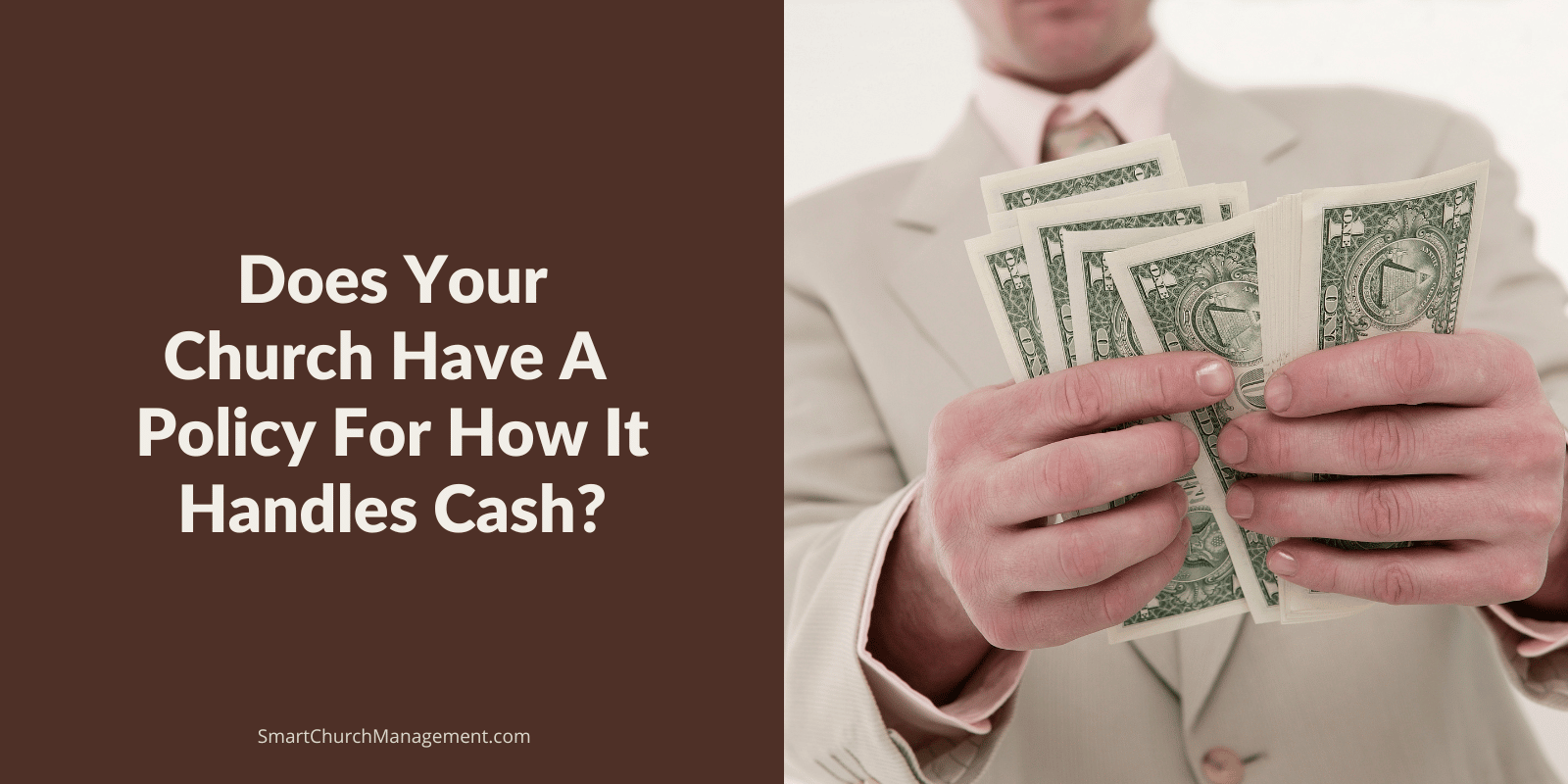Estimated reading time: 6 minutes
Churches are funded by the generous donations of their members. And, as long as churches accept cash offerings, there will be cash on hand.
The manner in which this cash is handled can determine the safety of those funds – meaning a church cash handling policy is important.
Why Is A Cash Handling Policy Important?
Detailed cash handling policies and procedures are critical to safeguarding church funds from embezzlement.
And yes, churches are just as susceptible to embezzlement as any other organization.
The reason is – unsupervised access to cash is simply too tempting for many people, particularly people with financial needs.
And yes, Christians steal, and they steal from churches.
It is the responsibility of church leadership to ensure that cash donations and cash assets are safeguarded and accounted for.
The study of fraud and embezzlement has shown that people with an incentive (a need), rationalization (I deserve this), and the right opportunity (easy access) are candidates for embezzling funds.
Cash handling procedures can help to protect the organization and the employee and prevent fraud.
Every church is different, and each has very specific needs when it comes to handling cash.
Some churches only handle cash when counting weekly offerings, but other churches handle cash at church events, lobby coffee shops, or church bookstores.
The basic expectation should be that cash is never handled by only one person.

Two-person cash handling policies ensure safe handling and eliminate the temptation to steal – even if only a few dollars.
Take the time to develop cash handling procedures and to train volunteers and employees on the importance of following the outlined steps.
The following are some general guidelines and things to think about that can help you develop a cash-handling policy specific to your church.
Example Cash Handling Policy
Purpose: To ensure control and safekeeping of church donations and cash assets and to minimize the risk of embezzlement
- A safe should be used to store all cash. Even small amounts of cash (petty cash) and cash register drawers should be secured and under lock and key at all times.
- There should be two non-related people who count the weekly offering.
- All employees and volunteers who handle cash should have a criminal background check.
- Counting volunteers should be rotated and supervised by a lead volunteer or church employee.
- There should be two people present whenever cash is transported from one location to another.
- There should be a cash count sheet that documents:
- Names of people counting, depositing, or removing cash from the safe.
- Date/time cash is deposited or removed from the safe.
- Date/time cash is removed or returned to safe.
- Cash breakdown – coins, bills, checks, credit card slips.
- Two signature lines for people handling cash.
- Safes should only be opened with two people present.
- The person with the combination to the safe should not be one of the people involved in handling the cash in the safe.
- The person with the combination to the safe should not have a key or access to the room where the safe is located.
- When cash bags are removed from the safe, they should be counted by two people, and both people should sign the cash count sheet acknowledging that the recorded amount of cash was in the bag.
- When cash is handed off to the next person, the person accepting the cash should count the cash before accepting it and keep the signed copy of the cash record with the cash.
- When cash is returned to the safe, it should again be double-counted and the cash count sheet should be signed by both parties.
- Bank deposit slips should match the cash handling sheets.
Records should be kept on all cash deposits and audited at least annually.
These are very simplistic guidelines and should be expanded and adapted to your particular church.
A Few Things To Consider
Where is the safe located? It is important that the safe is in a secure location and out of public sight.
Who has the keys to the room the safe is in? The person who has keys to the room should not be the same person who has the combination to the safe. Create a policy that instructs the person with the key to open the door for the person with the code. This will ensure the person with the code cannot access the room without a second person.
Do you conduct Background checks on everyone who has access to cash? Anyone who has access to cash should go through screening and a background check. Some organizations do credit checks to find out if there are financial issues with employees, which is a warning sign for possible embezzlement.
How often do you change the combination to the safe? Safe combinations should be changed whenever a person holding the combination leaves employment. Add this step to the exit interview form so that it becomes part of the process of employees leaving employment.
Does the safe have a drop slot? There should be a drop slot in the safe to allow for one-way access to the safe, eliminating the need to unlock the safe every time a cash bag is deposited in the safe.
Is there a camera in the room where the safe is located? There should be a camera monitoring all safes and cash registers, particularly those that are isolated and out of a manager’s sight.
Embezzlement Is A Real Problem
Organizations lose billions of dollars each year from embezzlement, and churches are not exempt.
Safeguarding against church embezzlement is a leadership responsibility that should not be taken lightly.
Good policies, procedures, and oversight of cash handling are one way to safeguard against the theft of church cash.
If you want to learn more about preventing fraud, there is a great book, Preventing and Detecting Employee Theft and Embezzlement, available on Amazon.
What does your church do to prevent embezzlement of church funds?
If you are a member of SCM, you can access a cash handling policy form here. If you are not a member and would like to access these documents, you can learn more here.



